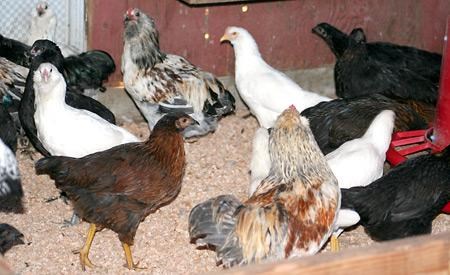City of Powell River council split on the third reading of an animal control bylaw amendment that would have permitted property owners to keep poultry in their yards.
In the absence of Councillor Myrna Leishman, who was sick, the vote was tied, which meant third reading was defeated. Councillors Russell Brewer, Debbie Dee and Maggie Hathaway voted in favour of the amendment, while Mayor Dave Formosa and councillors Chris McNaughton and Jim Palm voted in opposition.
The amendment to the animal control bylaw permits the keeping, in an appropriate enclosure, of up to three poultry in all single family and duplex lots in the city. The bylaw defines poultry as a domestic fowl, duck, goose, turkey and similar domestic birds.
A public hearing about the bylaw was held just before the council meeting. About 20 people attended the meeting, and eight people spoke in favour of the amendment. Audrey Hill, volunteer branch manager of the SPCA, spoke in opposition to it. She expressed concerns about the health and well-being of birds. She pointed out that the SPCA doesn’t have a facility to house fowl that are seized from their owners and chickens are at risk of contracting avian flu, which could spread to pet birds. “We believe complaints will accelerate to the bylaw department and they are already strapped to deal with the volume of complaints they have at present with dogs and cats,” she said. “This is also very true of our SPCA volunteers.”
Other speakers pointed out there hasn’t been a case of avian flu in North America related to backyard chickens, other jurisdictions that have allowed people to have chickens have experienced few complaints and keeping chickens is part of a global trend toward food security, supporting the local production of food and sustainability.
Wendy Devlin, vice-president of Powell River Farmers’ Institute, said the organization has pledged to provide the public with educational information about proper poultry keeping and has offered to dispose of unwanted or sick birds. It will also post proper chicken-keeping practices on its website.
Many speakers referred to the successful Hens in the Hood pilot project, a Career Link youth employment initiative that oversaw 10 urban hen test sites in the city. Lyn Adamson, the coordinator of the project, said the results were “really positive.” She said the project demonstrated raising chickens can be done safely. As well, a template for a chicken enclosure was developed during the project and that will be made available to the public. “The city has signed a Sustainability Charter and I really believe that this type of project is a really small step toward becoming a more sustainable city,” she said. She added she believed risks could be mitigated and “should not stand in the way of citizens having a right to grow and prepare their own food.”
The city also received eight written submissions from the public, two in opposition and four in support. One letter supported the idea of allowing people to keep small flocks in their yards, but expressed concern about wildlife being attracted to the fowl.
As well, Dan Glover, Vancouver Coastal Health’s environmental health officer for the Powell River region, submitted a letter. He stated he supported the amendment, noting it was a “step in the right direction to further enhance food security and public health in the region.” However, he encouraged the city to move beyond the general language in the bylaw regarding enclosures and recommended a second look at it, with an eye to best practices and prevention of rodent infestation and other pests. He recommended standards for the enclosures, education for the owners of the animals and bylaw enforcement.
Both McNaughton and Palm referenced Glover’s letter in their comments. Palm also mentioned that he had contacted a pest control business owner, who told him rats are a growing problem throughout BC, as they are attracted to composts as well as chicken food. “He said to me that every couple, male and female rat, can produce up to 600 offspring annually,” said Palm. “Now that’s a lot of rats. He said you might not have a problem in year one, but you could have a big problem in year two.”
Brewer said he heard a lot of commitment from organizations that work in the community to adhere to best practices and to assist with public education. “We need to move forward,” he said.
Hathaway said she thought everything the city needed was in the bylaw. “If people aren’t following those steps, then we can enforce it with this bylaw as it is.”
But Palm reiterated that Glover specifically stated, “We do encourage the city to move beyond the currently proposed, very general language in Section 31 addressing enclosures and recommend a section be included to more specifically describe best practices for construction and management standards, not only to ensure humane treatment of poultry, but also to prevent rodent infestation or other pests.”
McNaughton said he thought it was important to “get it right.” He said Glover’s letter should be referred to staff for a report on Glover’s suggestions. “I support all that we are trying to do,” he said. “I want to get there, but I want to just make sure we got it right.”
Dee pointed out councillors received the letter at 5 pm that day, after all of the work had been done. “I think we pass this third reading now,” she said “At some future date if it becomes a problem, that people are building sub-standard, then we can always add something to the bylaw then.”
After the third reading was defeated, McNaughton made a motion to refer Glover’s letter to staff to provide a report with recommendations on the suggestions contained in the letter.
The report is expected to be ready for the next committee-of-the-whole meeting, scheduled for 1 pm on Thursday, November 1 in the committee room at city hall.



